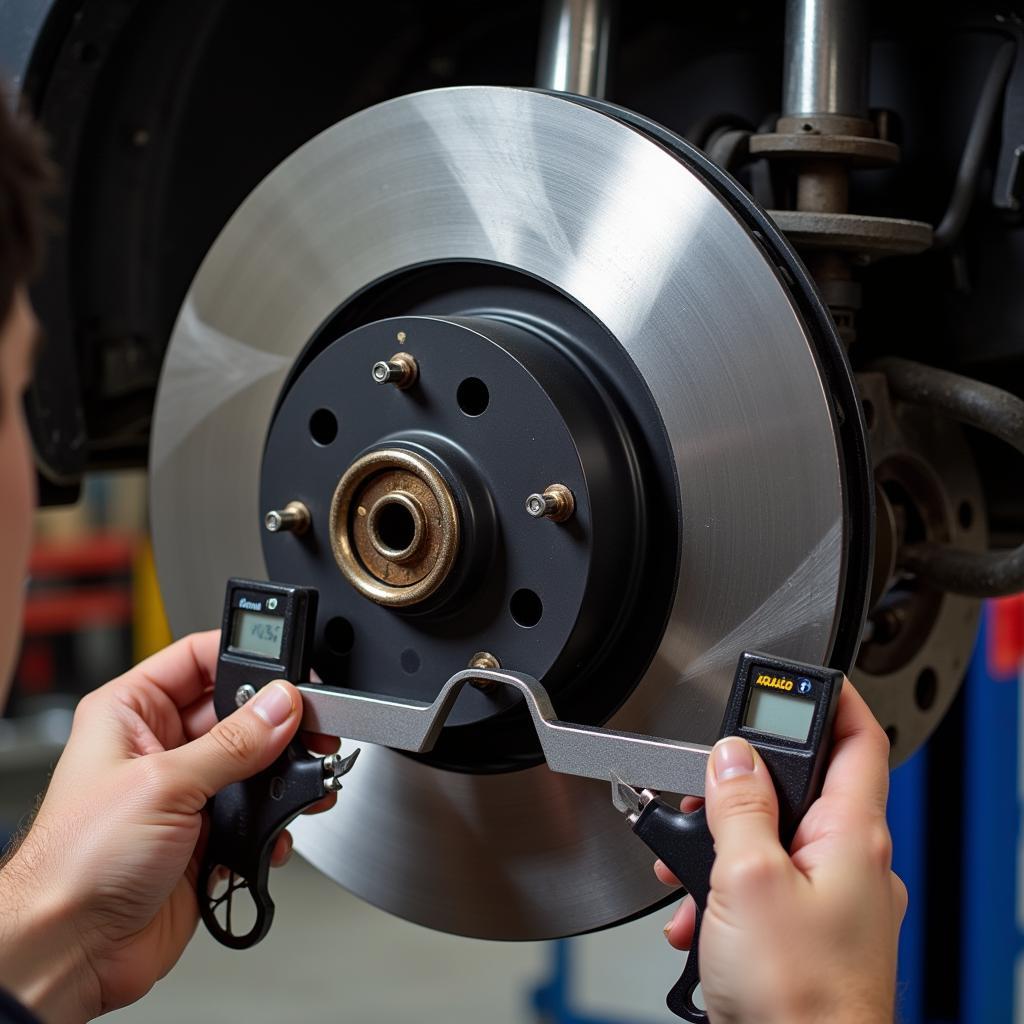Car Brake Problem Symptoms can range from subtle to severe, impacting your vehicle’s safety and performance. Understanding these symptoms is crucial for maintaining your car and ensuring safe driving conditions. This guide will help car owners, mechanics, and technicians diagnose and address common brake issues.
Similar to brake problems in cars, many issues can arise with your braking system, and early detection is key to preventing costly repairs and dangerous situations. This article will delve into various symptoms, explaining their underlying causes and providing practical advice for resolving them.
Recognizing Common Car Brake Problem Symptoms
Several indicators can point towards potential problems with your braking system. Some of the most frequent car brake problem symptoms include:
- Squealing or Grinding Noises: These sounds often indicate worn brake pads. The metal backing plate of the pad can contact the rotor, creating a loud, high-pitched squeal or a grinding noise.
- Spongy Brake Pedal: A brake pedal that feels soft or goes too far down could signal air in the brake lines, a leak in the brake fluid reservoir, or worn brake components.
- Pulling to One Side: If your car veers left or right when braking, it might be due to uneven brake pad wear, a stuck caliper, or a problem with the brake hydraulic system.
- Vibrating Brake Pedal: A pulsating or vibrating brake pedal can indicate warped brake rotors, which often occurs due to overheating.
- Brake Warning Light: This light on your dashboard is a clear indication of a potential brake system malfunction. It could be related to low brake fluid, worn brake pads, or a more serious issue.
Diagnosing the Root Cause of Brake Issues
Once you’ve identified a specific car brake problem symptom, diagnosing the underlying cause is the next step. This process can involve:
- Visual Inspection: Check the brake pads for wear and tear. Look for leaks in the brake lines and check the brake fluid level in the reservoir.
- Brake Pad Measurement: Use a caliper to measure the thickness of the brake pads. If they are below the recommended minimum thickness, they need replacing.
- Rotor Inspection: Examine the rotors for warping or scoring. Warped rotors can often be resurfaced, but severely damaged rotors may require replacement.
- Brake Fluid Testing: Check the brake fluid for contamination or moisture. Contaminated fluid can reduce braking performance and damage brake components.
This relates to the common issues found in problem cars and emphasizes the importance of regular maintenance. By addressing brake problems promptly, you can avoid further damage and ensure the safety of your vehicle.
Why are my brakes making a grinding noise?
A grinding noise coming from your brakes is typically caused by metal-on-metal contact, most likely your brake pads being completely worn down and the metal backing plate grinding against the rotor. This requires immediate attention.
What does a soft brake pedal mean?
A soft brake pedal often indicates air in the brake lines, a leak in the brake system, or a problem with the master cylinder. This can significantly reduce braking efficiency and is a serious safety concern.
 Mechanic inspecting brake rotor for damage
Mechanic inspecting brake rotor for damage
Just like understanding the porsche cayman car problems, knowing the specifics of your car’s braking system can help you identify and resolve issues more effectively. Regular maintenance can prevent many common problems.
How to Fix Common Car Brake Problems
Depending on the specific car brake problem symptom and its root cause, the solution might involve:
- Replacing Brake Pads: This is a routine maintenance task that should be performed when the pads reach a certain wear limit.
- Resurfacing or Replacing Rotors: Warped rotors can often be resurfaced, but severely damaged rotors will need replacement.
- Bleeding the Brakes: This process removes air from the brake lines, restoring proper brake pedal feel and function.
- Repairing or Replacing Brake Calipers: Stuck or leaking calipers will need to be repaired or replaced to ensure proper brake operation.
- Replacing Brake Fluid: Old or contaminated brake fluid should be flushed and replaced with fresh fluid.
Knowing that yes everyone has problems with their car can make dealing with car troubles less daunting. Brake problems are common, but with proper maintenance and timely repairs, they can be effectively managed. This is especially important for services like zipcar car problems where maintaining a safe and reliable fleet is crucial.
Conclusion
Car brake problem symptoms should never be ignored. Recognizing and addressing these symptoms promptly can prevent more serious issues and ensure your safety on the road. Regular maintenance and timely repairs are essential for maintaining a reliable and safe braking system.
If you are experiencing any car brake problems, we encourage you to connect with us at AutoTipPro for professional assistance. Our experienced technicians can diagnose and resolve any brake issue, ensuring your vehicle’s safety and performance. You can reach us at +1 (641) 206-8880 or visit our office at 500 N St Mary’s St, San Antonio, TX 78205, United States.






Leave a Reply